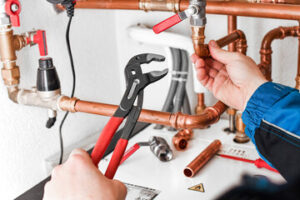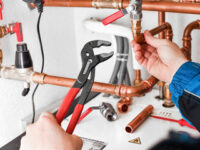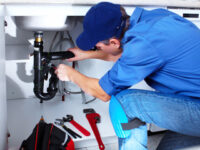Why Hire a Plumber?
Plumbers are a vital part of our daily lives. They help us access clean water and drainage systems that eliminate waste safely. Plumbers Aurora CO also designs plumbing systems for new constructions and works on fire sprinkler systems. Plumbers need critical thinking and verbal communication skills to solve problems. They must also have physical strength and stamina to perform strenuous tasks.
 Plumbers assemble, detect issues, and repair pipes transporting water, sewage, and gas. They may also work on plumbing fixtures like toilets, showers, sinks, and bathtubs. They use hand and power tools to perform their tasks and often work in confined spaces or on high structures. Some plumbers also specialize in repairing and installing backflow prevention devices. Other job duties include analyzing plumbing problems, estimating cost and time, training less experienced plumbers, and handling customer service.
Plumbers assemble, detect issues, and repair pipes transporting water, sewage, and gas. They may also work on plumbing fixtures like toilets, showers, sinks, and bathtubs. They use hand and power tools to perform their tasks and often work in confined spaces or on high structures. Some plumbers also specialize in repairing and installing backflow prevention devices. Other job duties include analyzing plumbing problems, estimating cost and time, training less experienced plumbers, and handling customer service.
Residential plumbers are responsible for the installation and repair of plumbing systems in homes, apartments, and other residential buildings. They also install and repair appliances that use water, such as washing machines, dryers, dishwashers, and hot water heaters. Plumbers must be comfortable working in tight spaces and navigating around furniture and other household items. They also must adhere to safety protocols when working with dangerous equipment or in confined spaces.
Commercial plumbers work on large-scale plumbing projects in commercial properties, such as offices, stores, and restaurants. They typically collaborate with electrical professionals to ensure that the plumbing and electrical systems can function together safely. Commercial plumbers must be knowledgeable about the different types of commercial plumbing fixtures, including water supply lines, sewer lines, and drainage systems.
Construction plumbers work on new building projects, collaborating with construction teams and architects to ensure that plumbing systems are integrated seamlessly into the overall project plan. They must be able to read blueprints and understand the specifications for each plumbing fixture. They also need to be able to handle heavy construction equipment, such as pipe cutters and wrenches.
Green plumbers are specialists in environmentally friendly plumbing practices and can recommend ways to reduce the amount of water used by households. They are also skilled in installing rainwater harvesting systems, low-flow faucets, and water-saving toilets.
A plumbing foreman supervises a crew of plumbers and other personnel on a construction or maintenance site. In addition to supervising the assembly and repair of plumbing systems, a plumbing foreman oversees other construction workers and assists management. He or she must have knowledge of construction and plumbing systems, and he or she should be able to read blueprints and calculate the dimensions of piping and tubing. He or she must be able to operate a variety of tools and equipment, including reamers, drain snakes, sewer cameras, and soldering tools.
Education requirements
Plumbers perform a variety of tasks, from repairing and installing sinks, toilets, tubs, and faucets in residential homes to maintaining water pipelines, waste management sites, and gas lines. They must be able to read blueprints and understand plumbing codes and regulations. They can work for specialized plumbing companies, or they can choose to open their own business. They may also have to handle customers and negotiate prices.
Those who want to become plumbers should have a high school diploma, or the equivalent. They can then take a vocational school program in plumbing, which typically takes two years. These programs include courses in installation methodologies, plumbing math, and plumbing design. Then, they can join an apprenticeship program. A typical apprenticeship lasts four to five years and includes a mix of on-the-job training and classroom instruction.
After completing an apprenticeship, plumbers can apply for a license to work independently. They will need to provide a notarized affidavit from master plumbers who will vouch for their work experience. The affidavits should include the dates and a description of the projects. Additionally, they should indicate that the master plumbers directly supervised the applicant.
It is also important for plumbers to review plumbing codes and regulations frequently, as they may change. It is also a good idea to learn the basics of plumbing, so they can do well on licensing exams. Plumbers should also be familiar with plumbing terminology, which will help them explain their work to clients.
Many state and local governments require plumbers to obtain a license before they can practice. New York City, for example, requires master plumbers to have seven years of work experience, including five years of experience in the design and construction of plumbing systems in commercial buildings. Besides education and experience, New York City also requires plumbers to pass background checks and licensing exams. There are also professional certifications available to plumbers, such as the National Inspection Testing and Certification (NITC) and the International Association of Plumbing and Mechanical Officials (ASSE). These certifications don’t replace licensing requirements, but they can make plumbers more competitive in the job market.
Work environment
Plumbers install and repair pipes, fixtures and appliances that carry water, gas or other liquids. They also unclog toilets and inspect and maintain septic systems. They are patient individuals with a practical mind and manual dexterity. They can work well in a team and are often responsible for maintaining plumbing systems in commercial or residential buildings.
They also need to be aware of industry-specific codes and regulations. They can be working in tight spaces and may need to wear protective equipment. They must be able to read blueprints and understand how pipe systems work. They can also use a wide variety of tools, including wrenches, pipe cutters, hacksaws, and bending equipment. They must also be able to follow safety protocols when working with chemicals and other hazardous materials.
Most plumbers have a high school diploma or equivalent and receive on-the-job training. They can also choose to attend a vocational school program, which provides classroom instruction along with hands-on learning. These programs usually last four to five years and include paid apprenticeship training. Plumbers can also obtain certification from the plumbing industry to demonstrate their skill and knowledge.
Plumbers can also work in industrial settings, where they are responsible for installing, repairing and maintaining large plumbing systems that serve many people at the same time. These systems may include fire sprinkler systems, heating and air conditioning units, water supply lines and drainage systems. Plumbers in this environment often need to collaborate with other professionals, such as engineers and architects.
Plumbers also work in private homes, where they must be able to navigate small, tight spaces. They also need to be able to interact with homeowners and tenants and explain plumbing problems and solutions. They must be able to determine whether a problem is urgent and make repairs on short notice. Many plumbers are self-employed and can set their own hours, but they must be on call when they are needed for emergencies. This means that they often work evenings and weekends. It is important for employers to specify the hours that are required in a job description, so that they can attract qualified candidates.
Job outlook
There are many benefits to working as a plumber. The pay is good, and it’s a great way to get an education in a trade that will help you throughout your career. In addition, it’s a great job for people who want to work independently.
The outlook for plumbers is very positive, with many opportunities available in a variety of locations. This is mainly due to growth in new construction and building renovations, as well as increased demand for bathroom remodelling. Other factors include the growing popularity of green building practices and the need to replace aging plumbing systems.
To be a successful plumber, you’ll need to have good manual dexterity and coordination. You’ll also need analytical thinking and interpersonal skills. The best places to find a job as a plumber are in construction companies, plumbing repair shops, and plumbing supply houses. In addition, many technical schools have programs for plumbing apprentices that offer paid training and experience.
Many plumbers work for large companies or government agencies, which tend to pay higher salaries than other employers. You can also find jobs through Craigslist or other online classifieds. Additionally, you can choose to specialize in certain types of projects or equipment. This can increase your earning potential even further.
As the demand for plumbing services increases, so does the need for skilled workers. In fact, the BLS reports that employment for pipefitters and steamfitters will grow much faster than other occupations. The demand is especially high in areas with older plumbing systems that need to be replaced.
The job market for plumbers is expected to be strong for the next decade, especially in states with high unemployment rates and a shortage of qualified employees. In addition, the growing popularity of green building practices is fueling demand for plumbers. However, it is important to note that the demand for plumbing services will be affected by the overall economy. If the economy slows down, there may be fewer job opportunities available.






